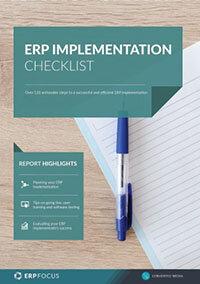Top 3 Causes of a Failed ERP Project
Nurturing your ERP project to success requires resources beyond your wildest expectations. These resources include your time and money, and they are poured into achieving ERP success. Very rarely are they diverted towards analysing causes of failed ERP projects. 3 key variables should be examined - if neglected they can be the downfall of the ERP process.
Communication
To fully-understand the importance of communication during an ERP project, it is helpful to imagine the “ERP supply chain”. From vendor to user, the ERP process is remarkably similar to any supply chain found in manufacturing and distribution. As is the case in these industries, communication is key to the supply chain's success.
Key stakeholders in the ERP project must be in constant contact. Requirements gathering, purchasing decisions and go-live will all fail if users, systems, IT, C-level and management aren’t singing from the same hymn sheet. The supply chain will grind to a halt and everyone involved will blame the adjacent parties. The required communication cannot simply be a weekly update of the summarised minutes from the impromptu conversation at the watercooler between the cousin of the PM and the estranged wife of someone in purchasing. It has to be the genuine communication of ideas and aspirations of all involved.
Research
In the words of Francis Bacon, “Knowledge is power”. Few processes in life fail to benefit from thorough research, and the ERP process is no different. A failed ERP project can occur due to poor requirements research, a lack of independent advice and hasty decision making - all of which can be rectified through proper research. Whether this is analysing the ERP market thoroughly or seeking advice on a specific issue, research will liberate you from the shackles of ERP uncertainty, allowing you to gain peer and executive support.
Change Management
When it comes to managing changes, it is wise to listen to a certain Mr David Bowie - “Ch-ch-ch-ch-changes, turn and face the strain”. Adaptation to change is not an idle process. Whether you are training your ERP users to use a new interface, or prioritising ERP requirements after unexpected budget changes, you have to be prepared to accept changes and act upon them. Workarounds and foreign processes only lead to a disillusioned workforce and a sceptical c-level.
If these 3 journeys to a failed ERP project haven't scared you enough, we summarised 9 more reasons for ERP failure in a recent slideshare presentation.
Free white paper

ERP Implementation: 9 steps to success
The 9 proven steps you should follow when implementing ERP

Featured white papers
-

ERP Software Pricing Guide
Get the latest pricing information on over 80 popular ERP systems, and learn how to budget for your ERP project in our free guide
Download -

ERP Implementation: 9 steps to success
The 9 proven steps you should follow when implementing ERP
Download -

ERP Implementation Checklist
Over 120 actionable steps to implementing a new ERP successfully
Download
Related articles
-

When is it time to replace a legacy ERP system?
Replacing your legacy ERP system with new software can revitalize your business operations.
-

Secret KPI: Why Your ERP Implementation Team Matters More Than Software
Learn how Godlan ensures successful ERP implementation for manufacturers with proven strategies &...
-

ERP implementation plan (ERP implementation process guide)
Everything you need to know about running a successful ERP implementation - and we mean everything

